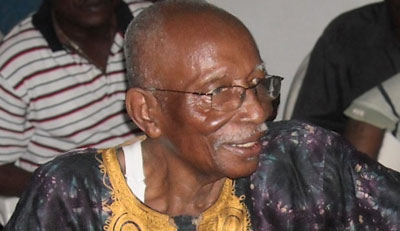Veteran journalist Stanton B. Peabody, a pioneer of press freedom in Liberia, turned 80 last month. Peabody, known to family and friends as “Bob Stan,” is a captivating figure full of wisdom and humor. We talked recently about his journalism career, one that has tracked the blossoming of the press in Liberia.
In 1945, Peabody set off on a 35-mile journey via canoe from his hometown of Marshall City to the capital, Monrovia. Peabody’s father had made arrangements for him to attend school in Monrovia and live with Jacob Brown, a family friend who started the Liberian Age newspaper. “I always had the desire to pick up the paper and read. I remember my guardian asked me ‘What do you want to be?’ I replied: ‘A newspaper boy,’ but my father wanted me to be a lawyer.” In the late 1940s, Peabody recalled, Liberia had but three newspapers, the Liberian Age, Daily Listener and Weekly Mirror. At the time, the term “reporter” did not even exist; there were only “newsboys,” he said. “Liberians at this time hardly seemed interested in the journalism field and reporters began to come from Ghana, Sierra Leone, and Nigeria.” This motivated Peabody to walk the streets of Liberia, visiting government offices searching for news. In college, he started working for the biweekly Liberian Age and never looked back. He managed to work his way up to the paper’s editorship until the publication was banned after the 1980 military coup led by Samuel Doe. “I started the Liberian Observer, which was the only independent news outlet that existed at that time. In those days my paper was the only one that wrote editorials.”
Government repression of the press in Liberia can be traced back to the 1960s, said Peabody, explaining that newspaper offices and printing presses were raided and journalists were repeatedly incarcerated for publishing articles that criticized the authorities. He was jailed a total of five times, the longest stretch being four days in prison. “They claimed they put me in there for safekeeping.” After being released in 1964, “I went directly to the Information Ministry and established the Press Union of Liberia (PUL) because at the time there was no organization to protect journalists.” In 2010, the PUL honored Peabody and named the conference room in its headquarters in his honor.
At the outbreak of the 1989 civil war, Peabody remained in Liberia while his family joined refugees fleeing to neighboring Ivory Coast. Although the family would reunite, there were moments of doubt. Peabody remembers the tears that fell from his daughters’ eyes as they left, wondering when and if they would see him again. “My family left and I chose to stay; this action defined me and my profession.”
Today, there are more than 15 newspapers in circulation, with dozens of actual reporters working beats and students training for the profession at the University of Liberia. Peabody believes Liberian journalism is in its best period ever, but there is still a lot of work to be done in regard to press freedom. “The authoritarian attitude of Liberian people in power is a big problem. They don’t like to be told they are wrong from someone they don’t consider their equal.”
Peabody’s drive and passion still get him up in the morning to write editorials for the Daily Observer. He left me with a few words of advice for young journalists today: “Be careful of how you report the news. Being over-anxious can cause writing the wrong thing; you lose credibility as a result of the wrong interpretation.”
